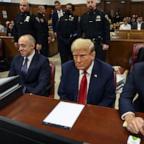Young voters poised to flex voting muscle
BLOOMINGTON, Ind. -- On a spring day warm enough for sunbathing, John Gillard and Josh Hall waited patiently in line at the Indiana University student union to cast their first votes — Gillard for Barack Obama, Hall for Hillary Rodham Clinton.
The bad news for Democrats: Hall and Gillard say they might vote Republican this fall if their presidential pick loses. The good news for democracy: Both say they'll definitely vote.
Hall, 18, and Gillard, 20, are part of a surge in voters under 30 that has changed the composition of the primary electorate and could at last turn young people into political players with clout.
Once people cast their first vote, voter-behavior researchers say, they get over their apprehensions and tend to show up at the polls.
"Voting is a habit-forming activity," says Donald Green, director of the Institution for Social and Policy Studies at Yale University. "The fact that so many young people have now voted … is a sign that we should expect higher-than-average voter turnout among young people in the fall."
If this season's patterns hold today in the Indiana and North Carolina primaries, voters under 30 are headed for increases not just in turnout but also in their share of the electorate.
"All signs point to a continuing upward trend," says Peter Levine, director of CIRCLE, a University of Maryland research center on civic engagement and youth. "These people will be more involved for their life to come."
For many years, young voters have been the dog that didn't bark. Each election has been heralded as the breakthrough year in which they finally would demonstrate their strength at the polls, but they've fallen short.
There's no guarantee, of course, that young voters will flock to the polls or that they will achieve critical mass. Obama is driving much of the primary-season youth vote, and some young people say they'll stay home if he isn't nominated.
In the 2004 general election, young voters did turn out in force — but so did everyone else. Voters under 30 held steady at about 18% of the electorate.
This year looks different for many reasons, topped by the Democrats' long, heated contest between a 60-year-old former first lady and a charismatic newcomer who is 46 and African-American. Youth turnout also is up somewhat on the Republican side, in part because of Texas Rep. Ron Paul — the anti-war, anti-tax iconoclast whose backers sparked a brushfire on the Internet.
The appeal of individual contenders is far from the only ingredient in the mix. Campaigns are doing intensive outreach to young people this year and making unprecedented use of the Internet to mobilize them. And the issues on voters' minds — the Iraq war and the economic slowdown — are potent.




